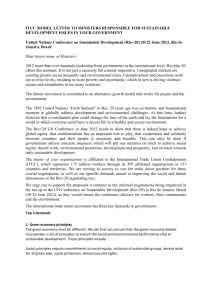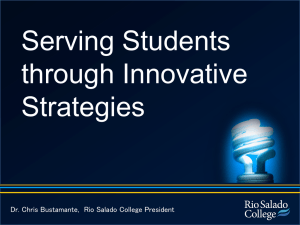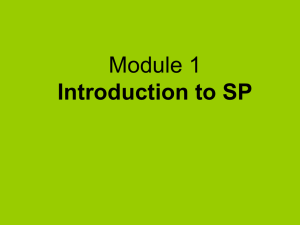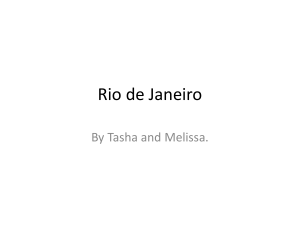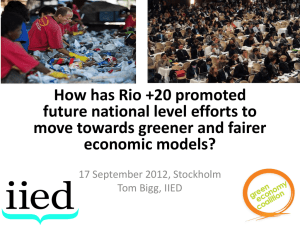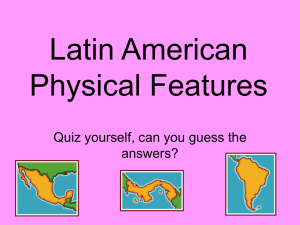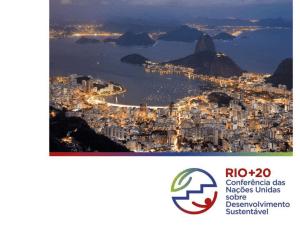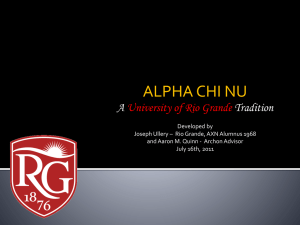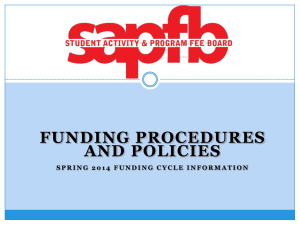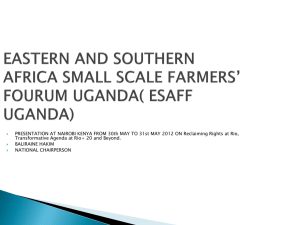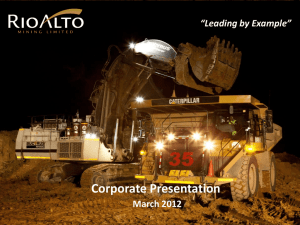Presentation on Rio+20 by Major groups programme coordinator
advertisement
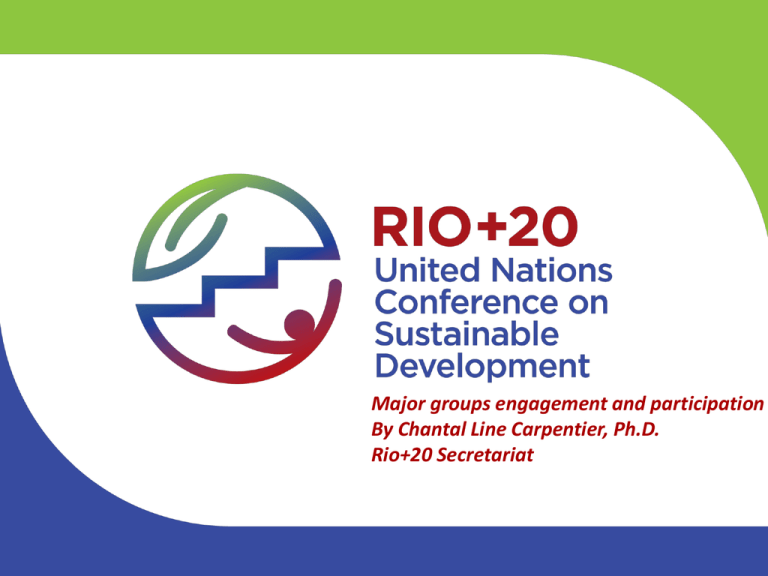
Major groups engagement and participation By Chantal Line Carpentier, Ph.D. Rio+20 Secretariat Building the Future we want The Road Map to Rio+20 … Objective and themes of the conference Outcome document State of the negotiations Major groups and other stakeholder activities Participation into the preparatory process Participation into the conference Objective and themes of the conference Secure renewed political commitment for sustainable development assessing progress to date and the remaining gaps in the implementation of the outcomes of the major summits on SD • addressing new and emerging challenges • UN General Assembly adopted a Resolution (A/RES/64/236) Thematic focus Include: • a green economy in the context of sustainable development and poverty eradication; • institutional framework for sustainable development Outcome Document • focused political document • ensuring implementation of commitments • addresses integration of economic, social and environmental goals, • coherence of action at all levels (within UN and countries) Outcome Document + 686 submissions received (by November 1 deadline) + 493 from Major groups and other stakeholders + Results of the regional Preparatory meetings and national meetings = zero-draft discussed 25-27 January Further negotiation during Informal-Informals meeting in March, April Finalized at the 3rd PrepCom in June Agreement to outcome document at Rio+20 conference Road-map to Rio 2011 2012 Fall Regional Preparatory meetings (RPMs), November 1 Input to compilation document Mid-November Compilation document 15-16 December Second Intersessional, UNHQ, NY • Nation-led meetings throughout Jan 25-27, NY Nation-led meetings throughout Negotiations 30 April - 4 May 13-15 June Third prep-com, Rio, Brazil 16-19 June Thematic days 20-22 June, Rio+20 conference, Rio The Co-chair zero draft Structure • 6,500 pages synthesised into 128 para on 20 pages • Vision • Renewing political commitment • Green economy in the context of … • Institutional framework for SD • Framework for Action What’s there? What’s new? • Global policy framework for corporate reporting • Major groups upfront; Principle 10 • Green economy: national and sectoral strategies, knowledge platform, toolkit, indicators, capacity development mechanism, roadmap • IFSD: Sustainable Development Council with voluntary review process; upgrading of UNEP • Sustainable Development Goals, measures of progress beyond GDP • Registry of commitments/accountability framework What’s there? What’s not so new? • Rights based approach to basic needs: food, water • Access to information technology • Reform of harmful subsidies with adequate protection of vulnerable groups • Sustainable energy for all • Social protection floor • Ombudsman for future generations What’s there to launch? • Negotiations on agreement governing marine biodiversity beyond national jurisdiction • Global observing network on ocean acidification • 10-year framework of programmes on SCP • Periodic report on the state of the planet’s carrying capacity 7 Priority Areas green jobs and social inclusion energy access, efficiency and sustainability Food security & sustainable agriculture sound water management sustainable cities sustainable management of the oceans improved resilience and disaster preparedness State of the negotiations Reactions • • • • Not ambitious enough Not action oriented enough Too much emphasis on the environment vs social Lacks good governance and rule of law, transparency, accountability, gender, role of youth and education as means to achieve sustainable development • Or too much! Lack focus on resource efficiency Ecological footprint in 2050- need more than 2 planets Not based Planetary Boundaries Not enough on equity Rising resource scarcity What’s next for Major Groups? Major Groups • Major groups and civil society are referred to in 8 of the 29 paragraphs of the GA resolution calling for the UN CSD in Rio in 2012 • Participate at all levels of the process, nationally regionally and globally including at the conference From Agenda 21 (Rio 1992) Children and Youth Indigenous People Women Farmers Major Groups NonGovernmental Organizations Local Authorities Scientific and Technological Community Business and Industry Workers and Trade Unions Capacity building workshops • Latin America and Caribbean Region, ECLAC • Africa Region, ECA and partners • The Arab Region, ESCWA and partners • Asia Pacific Region, ESCAP • North America, W,C,&E Europe Region, ECE • DPI/NGO Bonn Conference • Informal informals • Initial discussion • Brasil • UNEP Governing Council Showing and sharing support for Rio+20 Use the WEB Tools • all major groups and other relevant stakeholders can post documents, initiatives, petitions, meetings etc. on official web site. • By contacting your Major Groups Organizing Partners or, • If initiative does not fit neatly into one major groups sector email UNCSD2012@un.org to get a username/password http://www.uncsd2012.org/rio20/majorgroups Organizing Partners • 1 to 3 per major groups • Important to be added to their distribution list to stay informed of latest opportunities and contribute to position • Contact info available at: http://www.uncsd2012.org/rio20/index.php?menu=35 How can you influence? • Identify our area of concern • Develop or compose an enabling paragraph or sentence: We call for the UN to establish an expert group/a high level panel/ an committee of eminent persons/ to develop/ to work to establish etc ; • Not long, not too prescriptive and precise • Where in the document does our issue find its natural place? Strategic questions to ask yourselves • What is missing? • What needs to be strengthened? • Can we find agreed language and use that? • If something is missing, where can I place that? • Can I change the structure of the document? • If a paragraph is there already, what will it take to get rid of that paragraph? Examples of propositions so far • • • • • Convention on principle 10: access to information, participation, justice Universal access to clean energy Non-regression on environl law convention Corporate accountability (based on ISO2600) Precautionary Principle into a framework convention (bio-eng, nano, biotech) • Eco-city framework & standards • Convention on right to food • Prior and informed consent Participation into the conference Registration and Accreditation to Rio+20 Pre-registration is open to all organizations in consultative status with ECOSOC, on CSD roster on WSSD list until May 20, 2012 • • NGOs and other Major groups’ organisations NOT accredited to the UN (on CSD roster or on WSSD list, can apply until February 20, 2012 • Decisions from GA expected March 20, 2012 http://www.uncsd2012.org/rio20/majorgroups Thematic days, side & Sustainable Development learning centers • 4 thematic days for non-governmental actors in Rio, 16-19 June o Expected to lead to partnerships & launching of initiatives • Side events, learning centers & partnership fairs • Parallel events throughout the city http://www.uncsd2012.org/rio20/majorgroups The Bureau for the conference • runs the process leading up to the conference, • has been selected by the UN General Assembly • The African Group: Egypt and Botswana; • The Asian Group: Pakistan and South Korea; • GRULAC (Latin American and Caribbean Group): Argentina and Barbuda; • CEIT (Countries with Economies in Transition): Croatia and the Czech Republic; • WEOG (Western European and Others Group): the US (first half of the period) Canada (second half of the period) and Italy; • ex officio: Brazil. www.uncsd2012.org/major groups
